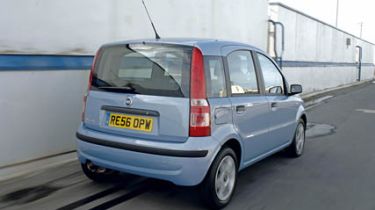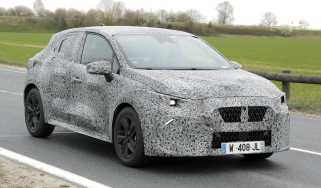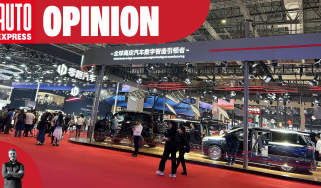Fiat Panda 1.2 Dynamic
The Fiat 500 is grabbing all the headlines at the moment, but while this cute retro recreation is the trendiest city car money can buy, its more practical Panda older brother still has much to offer.
The Fiat 500 is grabbing all the headlines at the moment, but while this cute retro recreation is the trendiest city car money can buy, its more practical Panda older brother still has much to offer.
It’s not as cool as the 500, but four years on from its launch, we still think the Panda looks great. The straight lines give it a utilitarian charm, and the boxy flanks are more interesting than the flat panels of the i10. And this sense of solidity is more than an illusion; the doors slam with a thud, compared to the slightly tinny noise made by the Hyundai’s.
Inside, the Panda’s dash design matches the chunky look of the exterior, and with all the crucial buttons and dials mounted high up, they are easy to use, too. But while the Fiat is certainly well put together, the large swathes of grey plastic don’t look as modern as the Hyundai’s trim.
Some of the gaps between the interior panels are bigger too, and overall the Panda is slightly low-rent in comparison. However, there’s a simplistic charm to the cabin, and even without the height-adjustable seat of the Hyundai, it’s easy to get comfortable behind the wheel.
Used - available now

2023 Kia
Sportage
36,988 milesAutomaticPetrol1.6L
Cash £22,676
2023 Polestar
2
37,552 milesAutomaticElectric
Cash £19,897
2022 BMW
3 Series Touring
65,529 milesAutomaticDiesel2.0L
Cash £19,997
2021 Mazda
CX-5
38,900 milesAutomaticPetrol2.0L
Cash £19,497The high-mounted gearlever is perfectly placed and visibility is excellent. But the Panda’s pedals are mounted close together and are quite upright, which can leave you with aching calf muscles on longer trips.
Rear space is adequate. Despite a shorter wheelbase than the i10, there’s only a fraction less legroom in the back, and the Fiat’s height means there’s plenty of head space.
But it’s the way the Panda makes you feel when you drive it that shows what a great car it is. For starters, the 1.2-litre petrol engine is less strained at higher revs than the Hyundai’s. Despite its slightly larger capacity, a 60bhp output is 5bhp down on the i10. Yet while it has a lower kerbweight, the Italian car takes 14.6 seconds to cover the 0-60mph sprint – that’s 1.3 seconds behind the i10. The Panda was slower to respond during our in-gear testing, too.
As a result, it’s not quite as eager, and this relaxed approach also applies to the handling. The Fiat has a softer suspension set-up, so is more forgiving and supple than the Hyundai. It soaks up bumpy town roads better, while on the motorway, it fidgets less and is more relaxed. This means there’s more body roll in the corners, but the soft suspension never gets bouncy or overly unsettled.
And despite being somewhat artificial, the steering is sharp enough to be reassuring, while the slightly wider wheels and tyres of the Panda mean grip is fine. There is a lot of dive under heavy braking, and with drum rear brakes, the Fiat took 38.9 metres to stop from 60mph, over three metres more than the all-disc-equipped Hyundai.
It’s a lack of standard equipment that really lets the Fiat down, though. Despite costing £500 more than the i10, the Dynamic-spec Panda is poorly equipped – you have to shell out even more if you want to bring its specification up to the Hyundai’s level.
On top of that, the Fiat’s three-year warranty and one-year recovery deal look meagre when compared to the Hyundai’s excellent five-year and three-year schemes. So the question is, does the Panda still represent the best blend of value and ability in this segment?
Details
Price: £7,595
Model tested: Fiat Panda 1.2 Dynamic
Chart position: 2
WHY: A previous Auto Express Car of the Year, the Panda is brilliantly designed and packaged.
Economy
During our time with the Panda, we averaged 42.6mpg, which gives the Fiat a 328-mile range. Both cars prove you don’t need to go diesel to get good economy.
Residuals
Poor residual values are a bugbear for Fiat. Despite the Panda’s popularity, it’s predicted to retain only 36 per cent of its list price after three years.
Servicing
Fiat’s garages ranked a lowly 31st in our dealer survey, and the Panda costs more to maintain. It has 12,000-mile service intervals from the outset.
Tax
Emissions are in the same 15 per cent tax bracket, so it’s only the higher list price that makes the Fiat the more costly company car. Your annual tax disc will be £115.







